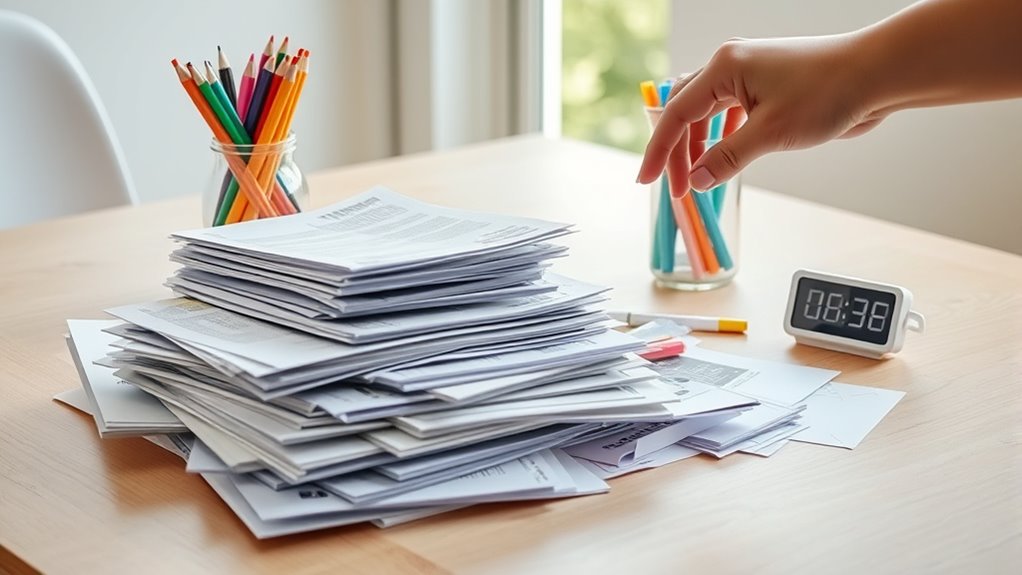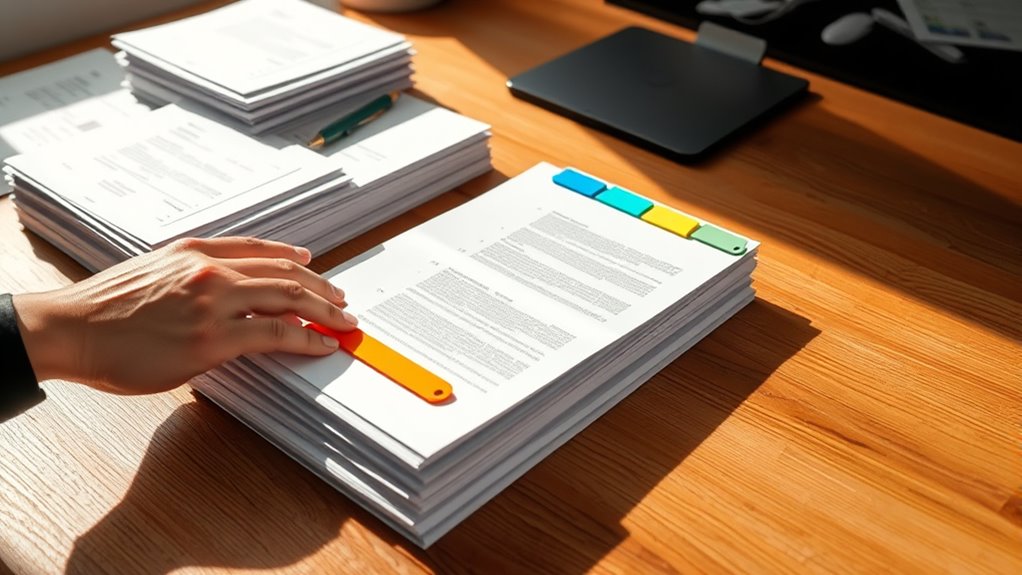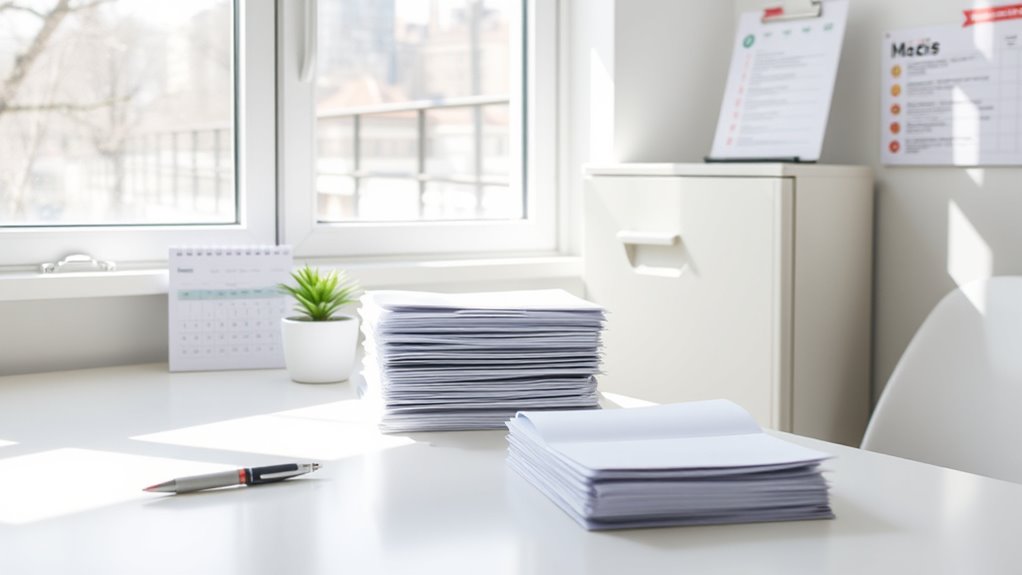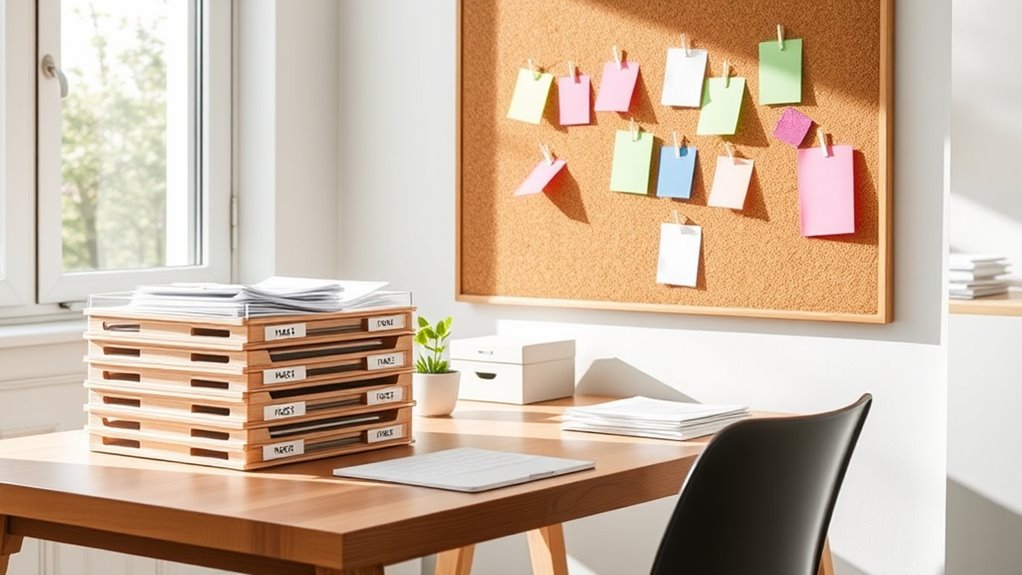To declutter paperwork effectively, start by gathering all your supplies and setting a timer to stay focused. Sort your documents into clear categories like financial, medical, and personal files. Decide what to keep, shred sensitive info, and recycle what’s unnecessary. Organize and store essential papers securely, then establish a routine to review and maintain order regularly. Keep your space clutter-free by applying these tips, and you’ll discover more ways to stay organized as you continue.
Key Takeaways
- Establish a routine with designated times for reviewing, sorting, and filing documents to prevent clutter buildup.
- Sort papers into clear categories like financial, medical, and warranties for easier management.
- Decide quickly what to keep, shred, or recycle, prioritizing digital archiving for space-saving storage.
- Use labeled folders, binders, and secure containers to organize and protect important physical documents.
- Regularly review and declutter both physical and digital files to maintain an organized and clutter-free environment.
Gather Your Supplies and Set a Timer

Before you start sorting through your paperwork, gather all the necessary supplies like folders, labels, and a trash bin. Having these ready makes the process smoother and more efficient. Choose containers that suit your needs, whether they’re small boxes or large filing cabinets, to keep everything organized. As you prepare, label your folders clearly to save time later—use descriptive titles so you know exactly what’s inside. Setting a timer is essential; it helps you stay focused and prevents the task from dragging on. Decide on a specific amount of time for each session, like 20 or 30 minutes, and stick to it. Once everything is in place, you’re ready to start decluttering systematically and with purpose. Using a confident approach can boost your motivation and make the process feel more manageable.
Sort Papers Into Categories

As you begin sorting your paperwork, focus on creating clear categories that reflect your needs and priorities. Effective paper categorization helps you find what you need quickly and stay organized. Start by grouping similar documents together—financial papers, medical records, warranties, and personal correspondence. Consider digital archiving for documents you want to keep long-term but don’t need in physical form. Scan important papers and store them securely on your device or cloud service. This reduces paper clutter and makes future access easier. As you categorize, be consistent with your labels and folders to streamline the process. Remember, the goal is to make your paperwork manageable and accessible, whether physically or digitally. Clear categories set a strong foundation for the next steps in decluttering. Incorporating data-driven strategies can also help you optimize your filing system for better efficiency.
Decide What to Keep, Shred, or Recycle

Once you’ve sorted your papers into categories, the next step is to decide what to keep, shred, or recycle. For documents you want to retain, consider digitizing them through document scanning to save space and guarantee easy access. Follow shredding best practices to protect sensitive information; use a cross-cut shredder for added security and shred documents into small pieces. Recycle papers that are no longer needed and don’t contain personal or confidential data. Be systematic—review each item carefully and determine its importance. Keep essential records, such as tax documents or legal papers, but eliminate duplicates and expired materials. Understanding the weight of pinball machines can help you plan for safe transportation and installation of your collection. This process helps reduce clutter and keeps your space organized, all while safeguarding your personal information.
Organize and Store Important Documents

How can you guarantee your important documents stay organized and easily accessible? Start by creating a dedicated filing system with labeled folders or binders. Use a fireproof and waterproof container to assure document security, protecting your papers from damage or theft. For long-term preservation, consider archival storage options designed to prevent deterioration over time. Store essential documents like birth certificates, wills, and insurance policies in a safe, centralized location. Keep digital copies in a secure cloud or external drive as backups. Regularly review and update your filing system to avoid clutter. Proper organization not only keeps your paperwork accessible but also provides peace of mind knowing your vital documents are safe and well-preserved. Incorporating a secure storage solution can further enhance your document protection efforts.
Establish a Maintenance Routine

To keep your paperwork organized over time, it’s essential to establish a regular maintenance routine. Developing daily or weekly paperwork habits helps prevent clutter from piling up again. Set aside a specific time each day or week to review incoming documents, discard unnecessary papers, and file important ones immediately. Consistency is key to clutter prevention, so stick to this schedule as much as possible. Use designated folders or trays to sort paperwork quickly, and avoid letting items accumulate on your desk or countertops. Over time, these habits will become second nature, making organization easier and reducing stress. Incorporating effective use of pimple patches techniques can also serve as a reminder to manage clutter efficiently—since structured routines help keep all areas of life orderly. Remember, maintaining order isn’t a one-time task—it’s an ongoing process that guarantees your paperwork stays tidy and manageable.
Tips for Preventing Future Paper Clutter

To keep paper clutter under control, start by setting up a clear filing system that works for you. Make it a habit to regularly toss out papers you no longer need, so clutter doesn’t pile up again. Also, consider using digital storage to save important documents and reduce physical paper. Incorporating organized storage solutions can further streamline your paperwork management.
Establish a Filing System
Creating an effective filing system is essential for preventing paper clutter from building up again. Start by organizing files with clear categories that match your needs. Use color coding to differentiate sections quickly—perhaps blue for bills, green for warranties, and yellow for personal documents. Labeling techniques are equally important; write clear, consistent labels using a legible font or handwriting. Place labels on folder tabs or directly on files to make retrieval simple. Keep frequently accessed files at eye level and store infrequently used documents in less accessible spots. Regularly review and update your system to guarantee it stays relevant. A well-structured, visually organized filing system saves time and reduces the chances of papers piling up, helping you maintain a clutter-free space long-term. Incorporating personality traits like organization and consistency can further enhance your system’s effectiveness.
Regularly Discard Unneeded Papers
Have you ever noticed how quickly papers can pile up again after you tidy up? Regularly discarding unneeded papers is key to ongoing clutter elimination and paper reduction. Set aside a weekly or bi-weekly time to review your documents and eliminate anything unnecessary. To help decide what to discard, consider this guide:
| Keep | Review Period | Discard if Not Necessary |
|---|---|---|
| Receipts | 1 month | No longer needed for taxes |
| Old bills | 6 months | Paid and settled |
| Drafts | 3 months | Completed or outdated |
| Promotional Mail | Weekly | Unrelated to current needs |
| Manuals | 1 year | Outdated or replaced |
Sticking to this process ensures ongoing clutter elimination and supports your paper reduction goals. Regularly reviewing your payment data can also help you spot and prevent unnecessary paper accumulation.
Use Digital Storage Solutions
Using digital storage solutions is one of the most effective ways to prevent future paper clutter. Start by scanning important documents and saving them to cloud storage, which offers easy access and backup. Use a document scanning app to quickly digitize receipts, bills, and records, then organize them into folders for easy retrieval. Cloud storage services like Dropbox or Google Drive keep your files secure and accessible from any device. Avoid physical piles by replacing paper copies with digital versions whenever possible. Regularly review and delete outdated files to keep your digital workspace streamlined. By adopting these habits, you’ll reduce clutter, save space, and guarantee your important documents are safe and easy to find.
Frequently Asked Questions
How Often Should I Review My Paperwork to Prevent Clutter?
You should review your paperwork regularly to stay organized and prevent clutter. A good paperwork review frequency is every three to six months, depending on the volume you handle. Incorporate clutter prevention strategies like sorting documents immediately, shredding outdated papers, and setting specific times for reviews. This routine helps you stay on top of your paperwork, reduces stress, and keeps your space tidy without overwhelming you with unnecessary clutter.
What Are the Best Digital Tools for Managing Documents?
Think of managing your documents like a well-organized library. Cloud storage and document scanning are your shelves and catalog system, making everything accessible and easy to find. Tools like Google Drive, Dropbox, or Evernote help you keep files tidy and searchable. I once scanned my receipts and stored them online, saving hours searching through paper. These digital tools streamline your paperwork and keep clutter at bay, ensuring you stay organized effortlessly.
How Do I Handle Sentimental or Irreplaceable Papers?
When handling sentimental or irreplaceable papers, you should focus on preserving memories, so consider digitizing keepsakes like letters, photos, or cards. Scan or photograph these items to create digital copies that are easy to store and access. Keep the originals in a safe, organized space for sentimental value, but avoid clutter by reducing physical copies. This way, you honor your memories while maintaining a tidy, clutter-free environment.
What Should I Do With Outdated Financial Statements?
You should review your outdated financial statements and decide which to keep and which to discard. Use archiving strategies for important records, such as storing them in labeled folders or digital backups. For documents no longer needed, opt for document shredding to protect your personal information. Regularly updating your financial records and implementing these steps helps you stay organized and reduces clutter efficiently.
How Can I Involve Family Members in Decluttering?
Imagine finding a handwritten note from a loved one while organizing your space—that’s the perfect moment to involve family participation. You can make decluttering a shared organization activity, turning it into quality time. Encourage everyone to sort through papers together, share stories, and decide what to keep or toss. This way, you not only declutter efficiently but also strengthen your family bonds through teamwork and shared goals.
Conclusion
Now, picture your neatly organized desk, papers stacked in tidy folders, and a sense of calm washing over you. By setting aside time today, you’ve cleared a cluttered maze into a smooth, manageable system. Each document now has its place, ready for quick access. Keep this order alive with regular check-ins, and soon, your workspace will feel like a gust of fresh air—clear, calm, and in control.









